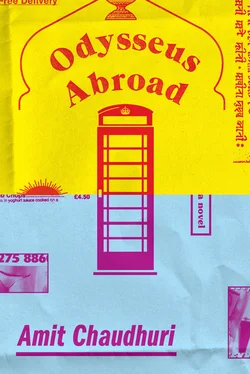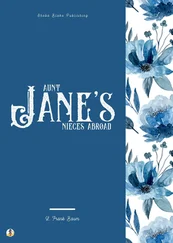Their romance remained buried beneath their different personalities; his still unformed, but with many of its traits already visible. She never found out if he had a sense of humour; and he could only deduce she had one from the poster on her door, showing a languorous Mrs. Thatcher being carried masterfully by Ronald Reagan in his arms. Her kindness, like her cane, he knew only from her curious exhibitions of empathy, such as the birdhouse she kept on her sill for transient but recurrent sparrows. He couldn’t crack, through her, what Englishness was; and, for her, the prickly mystery of being Indian clearly remained permanently unsolved. Sex stayed in the air, like an absurdity; once, when he asked her if he could write a tutorial essay on a topic different from what she’d suggested, she’d parted her legs, both swift and interminably slow — she was in a shortish skirt; he’d had to turn his eyes away — before crossing them again, and said, smiling faintly, “Do what you like. I believe in the pleasure principle.” He was unhappy about her tutelage — he was generally unhappy at the time — but masturbated thinking about her, twice.
In the second academic year (which had ended a month ago), he no longer saw her — which was a relief. He wanted to forget her, at least for now. She had taken ill; his second-year tutor told him one day that her visits had grown irregular. How had the subject come up — of Hilary Burton? Maybe from a recounting to the second-year tutor of his state of mind in the first year. Another day, the tutor announced — again, an association of anecdotes and harmless gossip led unexpectedly to her — that Dr. Burton had entered a coma. She was alive. Her brain wasn’t. She was too young. Ananda couldn’t believe it.
His second-year tutor, Richard Bertram, he was happier with. By some train of thought, Richard — maybe his surname — made Ananda think of P. G. Wodehouse, and this at once put him at ease. Richard, with his general cheeriness, and his mild astonishment each time Ananda came for a tutorial—“Hel- lo there, Ananda!”—didn’t belie this impression. He was very tall, which added to his air of being a large schoolboy who was destined to thrive in an educational institution. You could see him sometimes in the corridor, negotiating his bicycle by the handle, his trousers fastened with bicycle clips round his ankles, urgent and unselfconscious, confirming he had no natural habitat but college.
—
He was kind to Ananda, but was of a different species altogether — a Renaissance scholar. Like Hilary Burton, he was a product of Oxford, and this meant he was like one who’d assiduously made his way back to reality from a dream. The fact that the Renaissance was Richard’s intellectual domain meant there was — despite their bonhomie — an unspoken gulf between tutor and student, which was palpable to Ananda alone, and of which Richard was blissfully unmindful. Ananda viewed Richard with gratitude and friendship, but also anthropologically: as an English academic of a particular ilk and type. The reason was this — Ananda couldn’t seriously engage (whatever pretence he made) with someone whose interests were anterior to 1800. The nineteenth century was a subconscious cut-off date; behind it lay an incredible array of armadas, knaves, kings, people on horseback; Philip Sydney’s Arcadia and Spenser’s Faerie Queene . Even in the nineteenth century, it was only Wordsworth, Coleridge, Blake, and select bits of Shelley and Keats that he felt a loyalty towards, for their wonder at the actual universe; the deliberately histrionic (Byron and Browning) he avoided, even if he was intermittently susceptible to their gifts; the Victorians, too, whatever their persuasion — Tennyson, Clough, Housman — he’d cross the street in order not to have to meet them. Richard didn’t suspect at all how prone to irrational literary biases Ananda was: he was too self-absorbed and congenitally trustful to be suspicious. For Ananda — though he may not have articulated it to himself plainly, and despite its horrible wars and conflicts (and maybe not entirely unconnected to them) — the twentieth century was the most magnificent period ever. At once tragic and playful, so incredible and unparalleled, yet so familiar that you might not notice it! It was either taken for granted, because it was merely the present, or praised for the wrong reasons, because it represented progress; it was easy not to really think about it. Did Richard think of it — since, after all, he was of it, and in it? Twentieth-century literature! With its narrow subject, modern man — strange creature! With his retinue of habits, like getting on to buses, secreting the bus ticket in his pocket, or going to the dentist…However modern man might turn into Tiresias or a giant insect, he was, in many ways, more akin to Richard and Ananda than Ananda and Richard — given one’s investment in the sixteenth century and the other’s in T. S. Eliot; given one was English and the other Indian — were to each other.
—
When there were around five weeks left for the end of spring term, Richard suddenly departed because of his mother’s illness. She was dying by herself in Primrose Hill, worsening through the winter, unrevived by spring — English mothers had it tough in times of distress, as did their children. Dr. Bertram had written Ananda a beautiful letter of apology — beautiful for its handwriting, sweepingly inscribed in black ink — saying how sorry he was to abandon him and that he could sense Ananda would “burgeon and grow” next year. It was now that Nestor Davidson stepped in, to take the last few tutorials. Ananda already knew of “Mr. Davidson,” and had glimpsed him, a man of medium height, or on the lower side of medium, or at the upper end of short, what remained of his straight black hair combed across his head and never falling on the widening forehead, glasses with a conventional, thickish frame on his face, his mouth often set — but not in an English way — in silent determination, and the nose, slightly large and veined and ravaged, possessing an independent identity, and implying alcohol. He was a well-known novelist — but not well-known enough for Ananda to have heard of him before he came to this college. Ananda was apprehensive when Davidson was assigned as his temporary tutor — the set mouth, the determined look, the nose, made him wonder about his temper.
In fact, it became evident very early that Mr. Davidson and Ananda found the same kinds of things funny. Mr. Davidson (unlike Ananda’s first two tutors) was not shy of calling people “idiots,” and their laughter at randomly chosen human beings was essential to their common enjoyment of life as they sat down to tutorials. Midway through the tutorial, they broke to have tea, and biscuits from a large oval tin. Mr. Davidson didn’t consume that much alcohol, so the nose had no explanation. On the shelves on the left — on which the sun fell directly — were books by Isherwood, Fitzgerald ( Tender Is the Night ), Babel, Pound, Auden, Eliot, Bruno Schulz, Emily Dickinson, D. H. Lawrence, Singer, Olive Schreiner, and what were presumably his novels, An Outing in the Summer, Boer Diamonds, Intransigents , with his very own name (yes, that’s what it was) — Ananda glanced at it twice without giving himself away — descending the spine. Any place where you have a collection of books must be considered a second home, and when a man unobtrusively collects books he once wrote it hints at the fact he’s maybe not inwardly settled. Mr. Davidson was from South Africa; this accounted for the accent, which had had Ananda puzzling privately. He had come to London in the early sixties. Here he’d met the woman he only ever called “Sal,” and to whom he was married. In the college library, Ananda had stealthily read the first chapter of Nestor Davidson’s memoir, Time Regained , and, in the silence that he seldom entered or visited (he’d only been to the library one other time), he was struck by the vividness with which the arrival was described, the first encounter with King’s Cross Station, a journey made with a friend to look for digs at Highgate, the discovery as a bewildered loiterer of the backstreets of Victoria. Could one hold even London in wonder and affection? He himself was so at odds with London. As he held the book before him, he thought in a flash of his parents, who also spoke of their first bleak years in this crushing city with a kind of love.
Читать дальше











